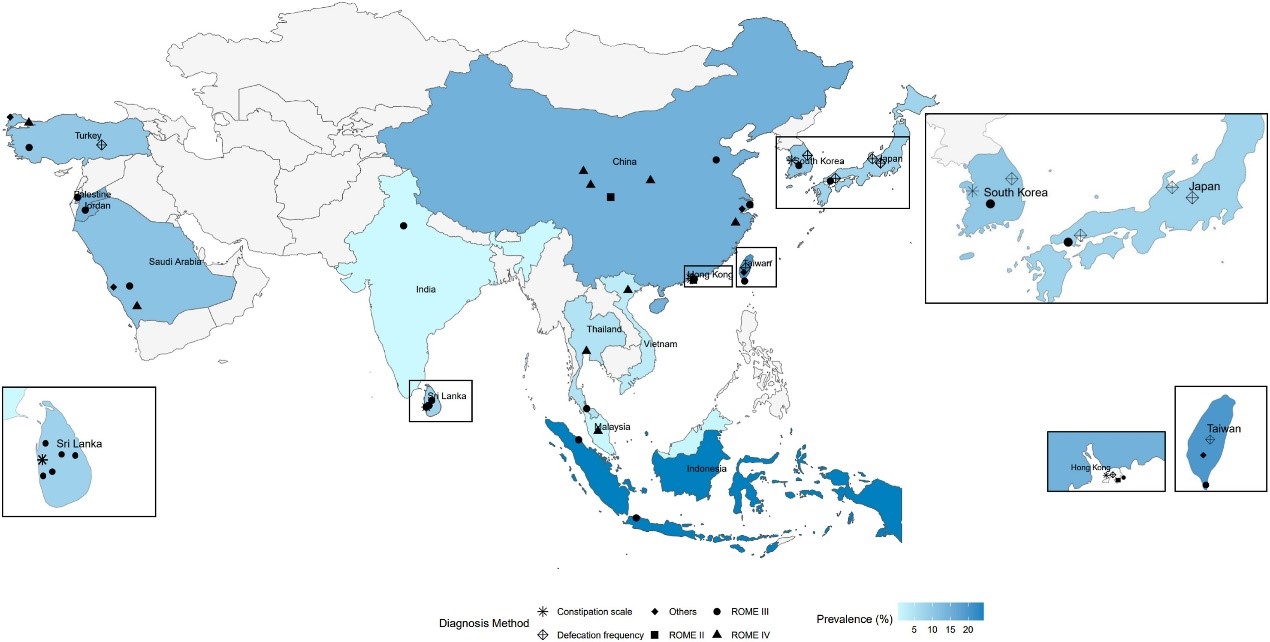Child or adult, nearly everyone knows what it feels like to be “a little backed up,” so to speak. Assistant Professor Ngan Thi Kim Nguyen from the NTNU Programs of Nutrition Science has conducted in-depth research on the prevalence of constipation among Asian children and its related factors. Her findings reveal that the prevalence of constipation among Asian children is approximately 12%, which is significantly lower than the global average of 29%. Among Asian regions, South Asia has a slightly lower prevalence rate (6.9%) compared to East Asia (14.1%). However, a surprising discovery is that the prevalence of constipation among school-aged children in Taiwan reaches 32.2%, far exceeding that of other regions in Asia.
Deputy Director of the Nutrition Science Programs, Szu-Chuan Shen, says that Assistant Professor Nguyen’s paper Prevalence and Determinants of Constipation in Children in Asia: A Systematic Review and Meta-Analysis was recently published in eClinical Medicine, a sub-journal of the internationally prestigious The Lancet. With an impact factor of 15.1, being published in eClinical Medicine speaks to the study’s significance in both the global medical and academic communities.

Figure 1: Assistant Professor Ngan Thi Kim Nguyen (left) from the Nutrition Science Programs has had her research published in eClinical Medicine, a sub-journal of the prestigious The Lancet.
Filling the Gaps in Pharmaceutical Research: A Comprehensive Look at Childhood Constipation from an Asian Perspective
Assistant Professor Ngan Thi Kim Nguyen from the Programs of Nutritional Science originally graduated as a medical doctor from University of Medicine and Pharmacy at Ho Chi Minh City in Vietnam and was also a practicing clinician. Driven by her deep interest in nutritional science, she moved to Taiwan alone to pursue International Master Degree in Medicine and then Ph.D. in School of Nutrition and Health Sciences at Taipei Medical University. Upon earning her doctorate, she joined the Undergraduate Program of Nutrition Science at National Taiwan Normal University as a faculty member.
Assistant Professor Nguyen explains that functional constipation (FC) is characterized by symptoms such as dry, hard stools, infrequent bowel movements, and incomplete evacuation. Despite ongoing research, the pathophysiology of constipation remains insufficiently understood. Currently, most studies on the nutritional factors related to functional constipation are based on data from children in Western countries, while research on Asian pediatric populations is severely lacking. However, given the significant differences between Asia and Western countries in terms of national conditions and dietary habits, the prevalence and causes of functional constipation in children may also differ. Therefore, it would be inappropriate to directly apply Western data to Asian children without further investigation.
Assistant Professor Nguyen shared that her personal motivation for studying constipation stemmed from her own niece’s struggles with this condition. She recalled, “There was a time when my little niece was in so much pain while trying to pass stool that she burst into tears—it shook me to the core.” Despite trying various treatments, including enemas, dietary changes, and applying established medical theories, her niece’s condition did not improve. Over time, the painful experiences even led to a fear of using the toilet. Witnessing her niece's suffering firsthand solidified Assistant Professor Nguyen’s determination to dedicate her research to understanding and addressing this issue.
Systematic Meta-Analysis: Mapping Childhood Constipation Across Asia
Reflecting on the research process, Assistant Professor Nguyen shared, “The collecting of data alone took two years, and completing the paper took another.” Her study employed a meta-analysis approach, systematically reviewing existing literature to reconstruct an overview of childhood constipation in Asia. She analyzed data from international academic databases, initially screening over 3,000 research papers before narrowing the selection to 50 studies containing relevant data on pediatric constipation in Asia. By examining the correlations within these datasets, she was able to generate advanced findings and provide a comprehensive clinical overview of constipation symptoms among children across Asia.

Figure 2: Research Process

Figure 3: Prevalence of Constipation and Diagnostic Methods Across 15 Countries or Regions. The gradient colors represent the prevalence of constipation. The darker the shade, the higher the prevalence. The symbols denote the diagnostic methods used in each study. If a study was conducted in two cities, the marker is placed between them; if conducted in three or more cities, the marker is positioned at the country's central location.
Assistant Professor Nguyen’s research highlights that in Asia, functional constipation is more prevalent among older children aged 1 to 12 compared to those under 1 year old. Aside from being the first study to report the prevalence of pediatric constipation in Asia, her findings challenge traditional assumptions. She discovered that, contrary to what was previously believed, neither geographical location nor gender are major factors influencing functional constipation. While dietary fiber is known to help alleviate constipation, the lack of comprehensive data on fiber intake among Asian children and its relationship to functional constipation makes it difficult to establish a definitive correlation at this stage.
Furthermore, Assistant Professor Nguyen’s research represents a breakthrough in the field of childhood constipation, uncovering a potential link between constipation and children’s mental health. She found that children experiencing psychological distress or significant stress—such as competing with siblings for parental attention—had a higher prevalence of constipation (22.6%). She also proposed a hypothesis: “Constipation and psychological stress may be mutually interactive. Mental health issues could trigger constipation, affect brain development, and ultimately have a negative impact on children's academic performance.”
The Ongoing Research: Exploring Links Between Constipation, Insomnia, Obesity, Gut Microbiota, and Psychological Stress
Assistant Professor Nguyen noted that the biggest limitation of her study was the inability to establish a clear link between sleep disorders and childhood constipation. “While many previous studies have shown a connection between constipation and sleep disorders in adults, our study did not find a significant association in children,” she explained. Despite this, her research has paved the way for further exploration in the field. She has now secured funding from the National Science and Technology Council (NSTC) and is actively conducting new studies to investigate the connections between childhood constipation, insomnia, obesity, gut microbiota, and psychological stress.
Assistant Professor Nguyen concluded that, historically, the diagnosis and treatment of childhood constipation have largely relied on standards and medications developed in Western countries. However, these methods may not be suitable for Asian children. Her research, which provides a comprehensive analysis of childhood constipation in Asia, offers valuable data that can help develop more accurate and tailored diagnostic frameworks specifically for Asian—and perhaps Taiwanese—children with functional constipation. (This article was provided by The Center of Public Affairs.)
Source: Djurijanto F., Lin S. H., Vo N. P., le N. Q. K., Nguyen-Hoang A., Shen S. C., Wu C. H., Chen J. Y., and Nguyen N. T. K., Prevalence and determinants of constipation in children in Asia: a systematic review and meta-analysis, EClinicalMedicine. (2024) 71, 102578, https://doi.org/10.1016/j.eclinm.2024.102578.





